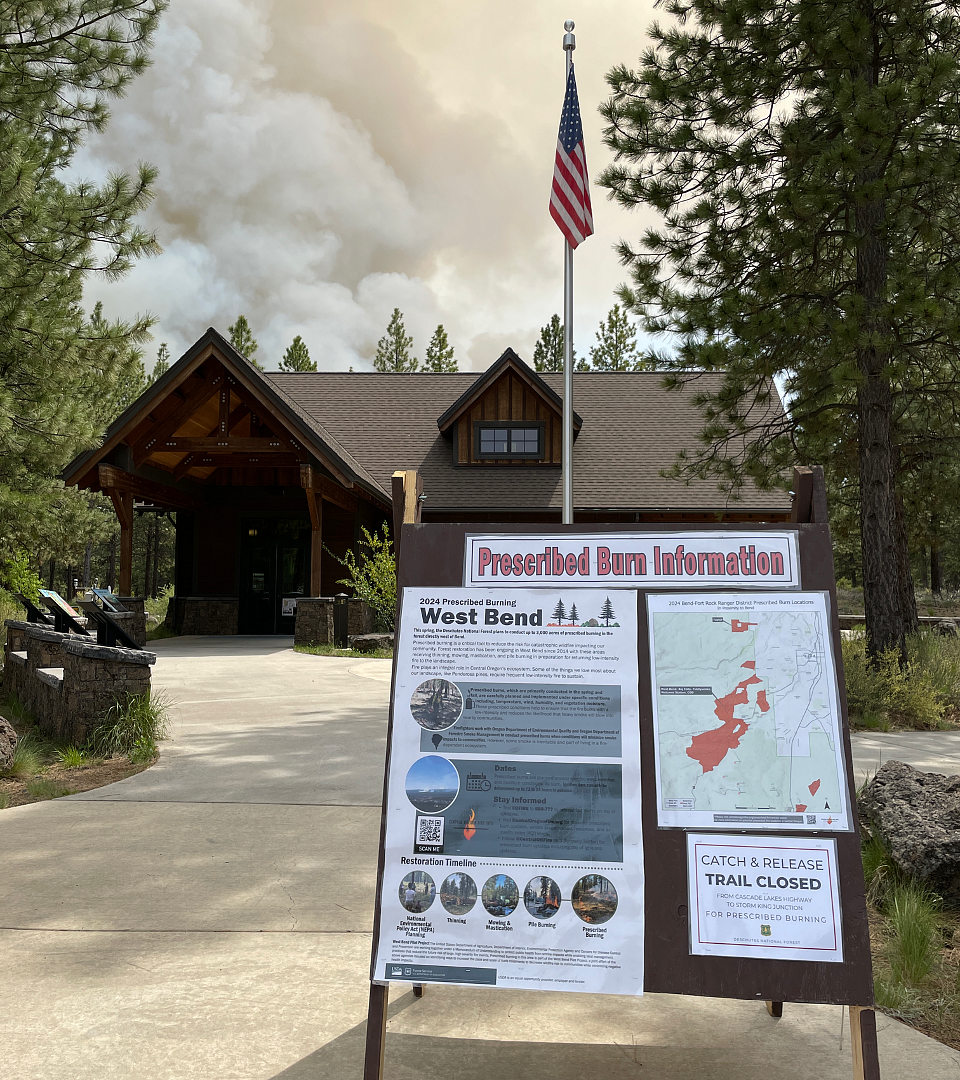West Bend Prescribed Fire After Action Review (2024)
Over the past year, the West Bend Prescribed Fire Pilot identified pathways forward for increasing the use of prescribed fire to achieve land management objectives at scale near wildland urban interface communities (WUI), while also engaging in risk reduction measures to minimize public health impacts. "Wildland fires - including both wildfires and prescribed fires - account for 44% of the nation's primary emissions of fine particulate matter (PM 2.5). EPA recognizes the increasing challenges and human health impacts that wildland fire and smoke pose in communities all around the country."1
By engaging in this pilot, federal and state air, environment, public health, local government and land management agencies, further clarified roles and responsibilities related to addressing forest health and public health. This effort included quickly forming a robust multi-agency coalition involving partners from NGOs, universities, and government agencies, and expediting the project timeline from a November 2023 tabletop planning exercise to prescribed burn implementation by May 2024.
By participating as a process reviewer and conducting an After-Action Review (AAR) of the pilot, the University of Oregon Center for Wildfire Smoke Research and Practice (The Smoke Center) supported shared learning among agencies, while also supporting the Smoke Center’s goals of assessing the effectiveness of community-level preparation and response strategies during smoke events in Oregon.
1. EPA. (2024). Wildland Fire, Air Quality, and Public Health Considerations Fact Sheet. Washington, D.C.
Working Paper 120: West Bend Prescribed Fire After-Action Review
The review reflects the five guiding principles of the Pacific Northwest Regional Joint Statement of Intent:
- Act with urgency.
- Protect public health, safety, and property.
- Identify and address the most limiting factors to implementing prescribed fire at scale as a management tool.
- Test new approaches, learn from them, and adapt based on experience.
- Be innovative and comprehensive, applying best practices.

Research from West Bend Prescribed Fire Pilot: One pager of research from the West Bend Prescribed Fire Pilot. Includes links to:
- After Action Review
- Outreach and Communications
- Air Quality Forecasting, Monitoring, and Analysis
- Community Survey
- Indoor Air Quality During Smoke
Timeline of Key Events Leading up to West Bend Pilot
2018
Oregon Governor's Wildfire Council
Report includes recommendations to expand pace and scale of prescribed fired, and provide direct public health interventions (i.e., air filtration devices).
2019
State Smoke Management Program Rule Amendment
Eases restrictions on prescribed burns, requires some communities to create Community Response Plans to identify and assist vulnerable populations.*
2019
House Bill Air Quality Funding
HB 5107 provided DEQ with $250,000 of general funds for Community Response Planning grants.
2021
Oregon Health Authority Public Health Modernization Funding
Included resourcing local public health authorities (county health departments) to hire staff focused on climate resilience.*
2021
SB 762, Oregon's Omnibus Wildfire Bill
Funded DEQ for community response planning grants, OHA for air filtration device distribution, and ODHS for grants to develop clean air shelters, usually by upgrading community building filtration.
2023
EPA Smoke Management in the Northwest Conference
Long-standing conference identified key needs for improving smoke management as:
- workgroups around specific topic and geographic areas
- leadership on interagency coordination needs on smoke and fire
- more smoke ready resources for communities
2023
GAO Report "Wildfire Smoke: Opportunities to Strengthen Federal Efforts to Manage Growing Risks"
Noted need for improved communication among federal, state, and partners for aligning fire and air quality strategies to protect public health (e.g., evaluating air quality communication effectiveness).
2023
Federal MOU and Workplan Signed
To improve and implement dissemination of tools and information for public health communication, smoke mitigation, and community engagement, including regional tabletop exercises.
2023
Wildfire Commission Recommendations
The 50-member non-partisan commission created policy recommendations including "Protecting Public Health" recommendations for smoke.
2024
Oregon Tabletop Exercise
To focus on prescribed fire and smoke management policies, align land management with public health goals, clarify federal and state policy frameworks, and define agency roles in the prescribed fire process.
2024
Pacific Northwest Regional Joint Statement of Intent Signed
Aligned with 2023 national MOU goals, identified pilots in West Bend, OR and North Central WA to test collaborative wildfire and smoke management strategies. Signed by the USDA Forest Service Region 6, EPA Region 10, Oregon DEQ, Oregon Dept. of Forestry, and Oregon Health Authority, and WA Depts. of Ecology, Health, and Natural Resources.
2024
West Bend Incident Management Team and Subgroups Created
- Robust joint public information team
- Weekly meetings for Agency Representatives
- Science subgroup
2024
West Bend Prescribed Burn
- 1864 Acres Burned - 7x Increase
- Indoor AQ - 79 Air Monitors
- Outdoor AQ - Monitoring & Modeling
- Community Survey (n=800+)
2024
New PNW Task Force on RX Fire
Established new Pacific Northwest Task Force on Prescribed Fire and Smoke Management, co-led by EPA Region 10 and USFS Region 6.
2024
Post Burn Field Tour
Field Tour and discussion of project outcomes and lessons learned.
2024
West Bend After Action Review
University of Oregon Smoke Center conducted an After-Action Review to support shared learning from the pilot. Included participant review and meetings with subgroups and external groups to share and revise findings.
* Bend created a Community Response Plan. Deschutes County Health Services hired a Regional Climate and Health Coordinator position. See the Resources list in the West Bend After Action Review Executive Summary for additional information.

